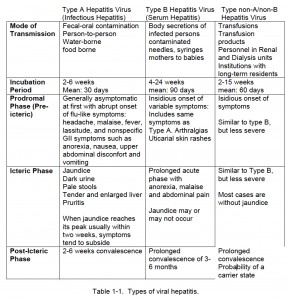a. Rest. Patients with viral hepatitis experience fatigue and malaise during all phases of the infection.
(1) Bed rest should be encouraged during the acute phase of the illness.
(2) During convalescence, the patient should be encouraged to alternate periods of rest with periods of activity.
b. Diet. Nonspecific GI symptoms such as anorexia, nausea, and abdominal pain occurs in-patients with hepatitis.
(1) Diet should be modified to conform to individual symptoms and tolerances.
(2) The patient should be encouraged to eat the prescribed diet to maintain an optimum balance of nutrients and to promote healing.
(3) Nursing personnel should note and document what the patient eats. If the patient is unable to tolerate the prescribed diet, the physician may order an alternate form of nutrition therapy.
c. Emotional Support. Viral hepatitis is a prolonged illness, often requiring lengthy hospitalization. The patient may become discouraged with the course of treatment and depressed because of separation from family.
(1) Make an effort to stop and visit with the patient whenever you have a few extra minutes. Allow the patient time to ventilate feelings.
(2) Arrange with occupational therapy or the facility Red Cross volunteers to provide books, cards, games, and other diversional activities.
(3) Allow time for visiting with family members.
d. Infection Control. Isolation and infection control procedures should be implemented IAW the local infection control SOP.
(1) Alert the hospital infection control nurse when a patient with hepatitis is admitted.
(2) Consult the infection control SOP for the procedures to be implemented for that particular type of hepatitis.
e. Referrals. It may be necessary to consult with other activities.
(1) The preventive medicine activity may be required to make a health investigation in certain cases of hepatitis.
(2) The community health nurse may be required to provide follow-up home visits.
(3) Consult the local SOP or infection control nurse for guidance.
f. Blood Donation. Patients who have had viral hepatitis should be instructed that it is unsafe for them to donate blood. They may contaminate a potential recipient.
Type A Hepatitis Virus Type B Hepatitis Virus Type non-A/non-B

